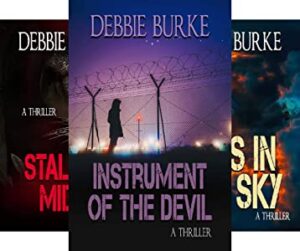
Photo credit: desatboy at Unsplash
By Debbie Burke
Let’s welcome another Brave Author who submitted today’s first page for critique, entitled The Scribe’s Boy. Please enjoy reading and we’ll discuss this on the flip side.
~~~
The worst thing about a beating is how much it hurts the next day. But this time I wasn’t going to wait that long. Seth and me were running away right now. Away from the Wiltshire Inn, away from being kitchen boys, away from Bernard and his fists like boulders.
The blood had dried on my cheek but my right eye still flashed and throbbed – I’d be lucky to see out of it tomorrow. Could barely see anything now, with darkness falling and this sudden downpour swallowing us. But dusk and the downpour helped hide us as we cowered further under the wet undergrowth, hoping those two horsemen wouldn’t see us. Bad luck the heavens opening like that just when we were making a run for it – we barely got across the road and into the trees. Even worse luck when the two riders came trotting towards us like smoky shadows and reined in at the hedge we’d scrambled under.
Seth shivered close against the curve of my body, his back to my front. He was folded, knees to chin, his bones digging into me. Our tunics and leggings were sopping wet and slimy with mud but I kept my arm tight around him, sheltering him best I could. The smell of wet earth and leaves filled me.
Twigs jabbed into my scalp and rain dribbled off my hair into my eyes. It stung.
“How’d you like that then, Alfred, eh?” Master Bernard’s fury rang in my head as if he were yelling right next to me. I flinched. Even curled up in the mud I could still hear him as he threw me across the kitchen to sprawl in the rushes on the earthen floor.
Beside me now Seth elbowed my ribs and whispered, “We should run for it.”
“No. They’re too close.” Fear kept me curled up, fear that had me by the throat and made me lie still and silent among knobbly roots and old leaves. My side ached and Seth pressing against it didn’t help. I tried not to tremble but the cold was eating me up. My hands wouldn’t stop shaking.
What I wouldn’t give for some stockpot stew right now. Bernard bragged he ran the best lodgings in the kingdom – always open to anyone willing to pay for pot luck. It was only his kitchen boys he didn’t like feeding.
~~~
Wow! I have to say I’m totally impressed. The Brave Author literally began with a wallop. I don’t know the protagonist yet but already feel sorry for him for being on the wrong end of a vicious beating.
Sentences two and three present the goal: escape from brutality.
Next, the Brave Author sets the scene with the location, establishes the approximate age (children rather than adults) and job of the protagonist and his fellow escapee, Seth, and introduces characters including Bernard, the bullying antagonist with fists like boulders.
One tiny suggestion: How about if you insert “Master” in the first paragraph? That shows the boys are in servitude: “…away from Master Bernard and his fists like boulders.”
A lot of information is packed into one sentence yet it flows well, is clear, and keeps the reader firmly in the action.
The next paragraph establishes the time (dusk), the weather (pouring rain), more location details about the road they crossed and the hedge they’re hiding in. Most important, it sets the era as historic by describing the searchers on horseback.
There is rich sensory detail in the next two paragraphs, especially touch and smell. The boys’ bony bodies not only offer physical description but also indicate the further abuse of being malnourished. The protagonist’s protectiveness toward Seth makes him not only sympathetic but admirable. He’s terrified yet still tries to help his friend.
I feel the chilly rain dripping on them, slimy mud, and sharp twigs poking the protagonist. Tunics and leggings additionally establish the historic time period.
The next paragraph is the only one that felt jarring.
“How’d you like that then, Alfred, eh?” Master Bernard’s fury rang in my head as if he were yelling right next to me. I flinched. Even curled up in the mud I could still hear him as he threw me across the kitchen to sprawl in the rushes on the earthen floor.
The flashback of Bernard attacking Alfred yanked me out of the story. It interrupts the forward momentum and intensity of the scene. Its main function seems to be a way to work in the protagonist’s name and more setting details like the rushes on the earthen floor.
I recommend cutting the flashback. The setting information can be woven in later. The Brave Author is definitely skillful enough to let the reader learn Alfred’s name without resorting to a flashback. One easy way is for Seth to call him by name: “We should run for it, Alfred.”
The next paragraph incorporates more wonderful sensory detail that evokes the boys’ terror.
The last paragraph is poignant, heartbreaking backstory of child slaves being starved by a cruel master. Reference to “the kingdom” sounds British, another location hint seamlessly layered in.
The title The Scribe’s Boy indicates the historic time period.
Dictionary.com defines a scribe as:
“a person who serves as a professional copyist, especially one who made copies of manuscripts before the invention of printing; a public clerk or writer, usually one having official status.”
Such a job would require the ability to read and write, a rarity in the time period that this submission appears to be set. People with education were respected and awarded high status in the community.
Presumably a scribe’s boy is an assistant or helper. The title possibly foreshadows Alfred’s future. Will the abused kitchen boy rise to success and freedom? I’m rooting for him.
The page is clean–no typos or spelling errors. “Seth and me were running away…” is ungrammatical but appropriate and consistent with Albert’s voice.
Every word counts on this page. There is no sloppy phrasing or unnecessary verbiage. Each sentence is as tight and resonant as a violin string.
This page hits all-important story elements to hook the reader: action, tension, conflict, setting, introduction of characters, sensory detail, emotion, and suspense.
Am I invested in the boys’ struggle? Completely. Am I eager to turn the page? Absolutely.
This is a really excellent first page, Brave Author. You should be proud. Let us know when this book is published.
~~~
TKZers: What are your impressions of Alfred, Seth, and Master Bernard? Do you have ideas or suggestions for the Brave Author? Would you read the book?
~~~

Try Instrument of the Devil for FREE. Then come back for more Tawny Lindholm Thrillers with Passion by Debbie Burke.

